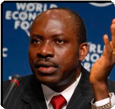The Governor, Central Bank of Nigeria, Professor Chukwuma Soludo, has dispelled the rumour of distress in the Nigerian banking industry, saying there were no traces of unsoundness in the present crops of banks operating within the country.
He stated this while delivering a keynote address at the 2007 Annual Bankers Dinner held in Lagos on Friday.
He said the nation’s banking industry still standing as the fastest growing in Africa today, the industry enjoyed the B+ rating for the first time by the Fitch rating agency.
The 2006 Bankers Magazine Rating of first 1000 banks in the World, he recalled, rated Intercontinental Bank as the 355th in the World.
Soludo warned key players in the sector against peddling unfounded rumors about fellow competitors in the industry, saying that this had been responsible for the average level of confidence on the industry even after the consolidation exercise.
“It has come to our notice that some banks perpetrate derogatory statements and wicked rumors about their counterparts in the same industry.
These have been confirmed baseless and unfounded over the years. This could be called a mutually assured destruction. We consider it of grave consequences to the industry.
But I would like to make it clear to all Nigerians that there is no unsound bank in Nigeria today. All subsequent perpetrators will be brought to book”, he said.
The governor noted that out of the numerous awards to African banks in 2007 alone, Nigerian banks carted away a total number of 15 awards, representing 50 per cent of the total number of awards. He said the rating of Nigeria amongst countries like Russia, India, China and Poland was a clear indication of the viability of her banking system.
With the nation’s foreign reserve currently standing at $49bn and hoping to hit the $50bn mark before end of the year, the pinning of the interest rate to a single digit and the fair stability in the exchange rates, Soludo said, the banks were getting better and stronger.
He, however, maintained that there was still much to be done by the banks to deepen intermediation by financing small and medium-scale enterprises, extending credit to the real sector and growing the mortgage finance.
The last Bankers Committee, according to Soludo, addressed the complaints from different quarters about the high cost of other charges such as the Value Added Tax and others, where it was agreed to be cumulatively clamped on 2 per cent or below.
Contrary to the opinion that the banks were raising excess capital, the CBN boss pointed out that the banks were not raising excess funds since their motives so far have been defined by their strategic agenda.
He further stated that if the nation must realize her strategic plan of Vision 2020, there was the need for stronger, more reliable and bigger banks to finance its infrastructural projects, while also adding that the apex bank and the Nigerian Deposit Insurance Corporation would keep their eyes on the structure and balance sheets of the banks to make sure that risks were appropriately priced in such a way that the banks were not unduly exposed to troubles.
Two banks were said to have met the $1bn mark as requirements for managing the country’s foreign reserve and were soon to be handed over the $500m each of the reserve to manage.
According to Soludo, foreigners who meet the CBN’s requirements for licensing would be allowed to operate in the country but the control of ownership and domination still remained the preserve of Nigerians.
One area of great concern to the regulatory authorities, according to Soludo, was the huge capital inflow into the country occasioned by the weakening of the Dollar in the last couple of months. This, he said had stemmed macro-economic volatility and left the local currency to struggle for a safe haven. A country that receives a GDP of 5 per cent in capital flow and sustained over a decade, he said, can not escape financial upheavals.
The economy seemed to be getting more sophisticated, he noted, but acute shortage of skills at all levels had become a national challenge. He said the market capitalization was presently still less than 50 per cent of total GDP, adding that the road to the Financial Systems Strategies 2020 had about four hundred initiatives before 2015, and to which the strategic agenda for the naira was central.
The upsurge in the World oil market prices, he said, would not deter the nation’s economy but rather provide the much-needed capital required for development.
Also speaking at the occasion, the President/ Chairman of Council of the Chartered Institute of Bankers of Nigeria, Mrs. Juliet Madubueze, said the Institute made efforts to impact positively on the confidence, transparency and performance of the financial system during the year.
These, she said were in areas such as the enactment of the CIBN Act No. 5 of 2007, the Ethics and Professionalism Desk at CIBN, the quality of training giving to practitioners in the industry the public enlightenments on the implications of issuing dud cheques, amongst others.
Daniel Ochefu
The Punch
Monday, November 5, 2007




